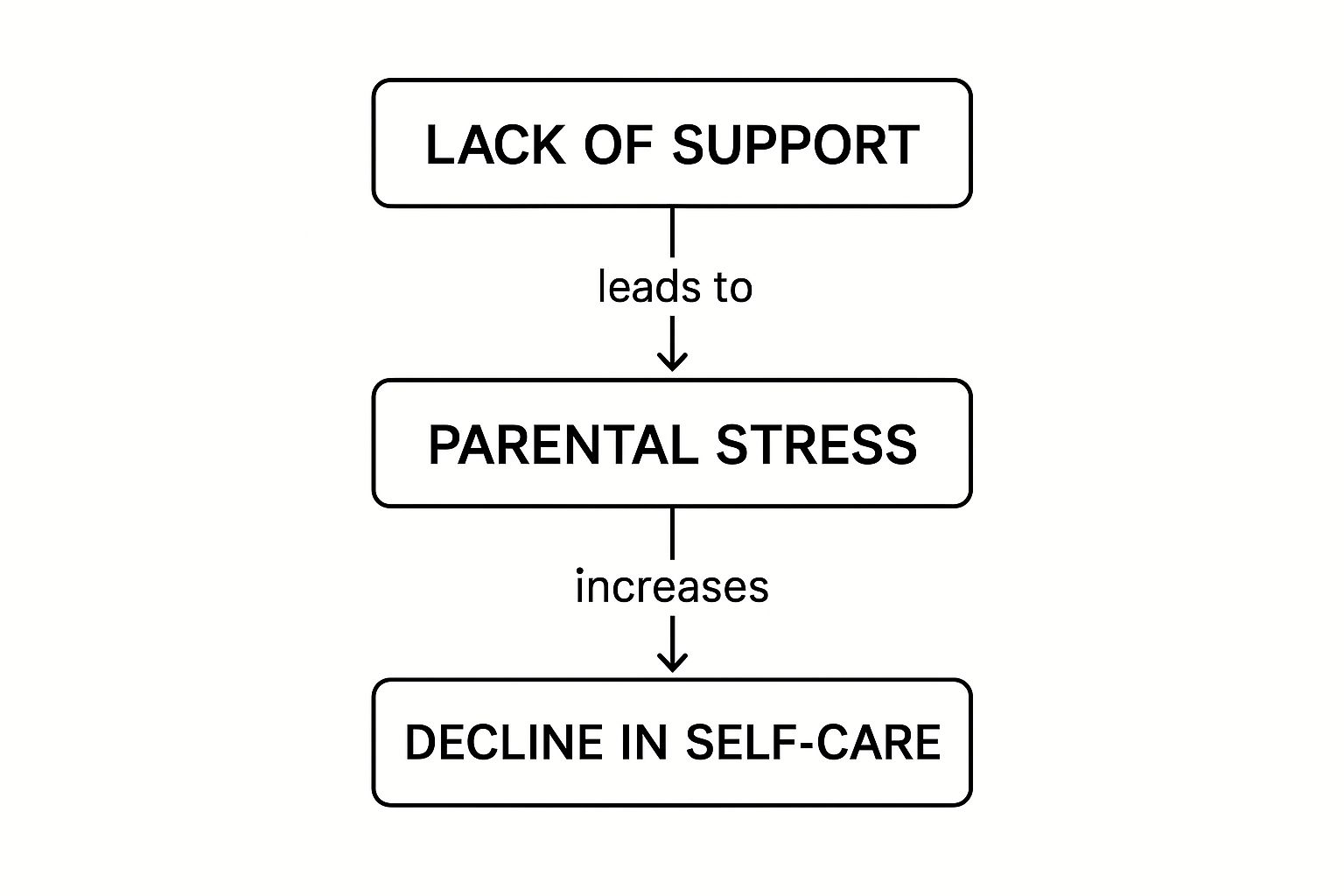Why Is Parenting So Hard? Strategies for Overcoming Challenges
Parenting is hard. It’s a relentless juggling act, forcing you to be an emotional rock for your family one minute and a financial provider the next, all while trying to figure out society's constantly shifting expectations. It’s a unique storm where psychological, social, and logistical pressures all hit at once, making it feel incredibly overwhelming—especially for modern working dads.
You're not just imagining it. The game has changed.
The Unspoken Pressures of Modern Fatherhood

If you feel like you're being pulled in a dozen different directions, that's because you are. The modern dad is expected to be more emotionally available and hands-on than any generation before him, yet the age-old pressure to provide for the family hasn't gone anywhere. This creates a quiet, internal tug-of-war that can be exhausting.
This guide goes beyond the generic "you got this, dad!" advice. We're going to get real about the clash between these competing roles, validating the struggle so many men feel but rarely talk about.
The New Rules of the Game
The job description for "dad" has expanded—massively. It’s no longer enough to just bring home a paycheck. You’re also expected to be a co-captain in the daily chaos of running a household and an emotionally attuned guide for your kids. This shift is a good thing, but it came without an instruction manual.
This guide will help you get a handle on:
- Societal Pressures: The outside expectations that are constantly shaping your identity as a father.
- Internal Loads: The mental and emotional weight of trying to be everything to everyone.
- Financial Strain: How money worries pour gasoline on every other parenting fire.
The core issue is that while the expectations for fathers have doubled—be present and provide—the support systems and societal structures haven't caught up. You're playing a new game with old rules.
Our goal here is to normalize these struggles. Answering why is parenting so hard isn’t about finding your flaws; it’s about finally acknowledging the immense pressure you're under. The table below outlines the core challenges we'll be tackling and the practical strategies we'll explore to manage them.
Core Challenges and Coping Strategies for Dads
This table provides a quick snapshot of the key stressors modern dads face and the types of practical, real-world solutions this guide will cover.
| Key Stressor | Area of Impact | Coping Strategy Focus |
|---|---|---|
| Role Conflict | Mental & Emotional Health | Setting boundaries and clarifying personal values. |
| Financial Pressure | Family Stability & Stress | Mindful spending and long-term financial planning. |
| Societal Expectations | Identity & Self-Worth | Ditching the "perfect dad" myth for authenticity. |
| Time Scarcity | Relationships & Burnout | Prioritizing high-impact connection over quantity. |
| Lack of Support | Isolation & Well-being | Building a personal support network and finding resources. |
Think of this guide as a clear roadmap. We'll break down these stressors and give you actionable strategies to find more calm, connection, and confidence in your role as a dad. You'll learn how to not just survive, but actually thrive.
Understanding Widespread Parental Stress

If you feel like parenting is harder now than it’s ever been, you’re not imagining things. That constant, immense pressure isn't a sign you're failing—it’s a reality shared by parents everywhere. For working dads, who often feel the need to project unwavering strength, just acknowledging this fact is a huge first step.
You're not carrying this weight by yourself. The feeling of being completely overwhelmed has become a defining part of modern parenthood, pushing stress levels to a breaking point for families. Understanding this helps you reframe your thinking from, "What's wrong with me?" to a much healthier, "How do I deal with this new reality?"
A Collective Experience of Overwhelm
The numbers tell a pretty stark story. A staggering 41% of parents in the U.S. say they feel so stressed on most days that they can barely function. Of those parents, 48% describe their stress as completely overwhelming. It’s gotten so bad that the U.S. Surgeon General even issued an advisory on the parental mental health crisis. You can read more about these parental stress findings and the reasons behind them.
This widespread anxiety isn't just about the classic challenges of raising kids. It's being fueled by a potent mix of modern, external pressures that feel relentless.
Your stress is a rational response to an increasingly complex world. It’s not a personal shortcoming but a reflection of the environment our children are growing up in.
Realizing your feelings are part of a larger trend is critical. It validates your experience and gives you permission to seek support without feeling ashamed. Putting your own well-being first isn’t selfish; it’s an essential part of being an effective and present dad. Our guide on dad mental health dives into practical strategies for managing these exact pressures.
Why Modern Parenting Feels So High-Stakes
A few major external factors have collided to crank up parental anxiety, making the job feel harder and more consequential than ever. These aren't just abstract threats; they are daily concerns for parents trying to raise happy, healthy kids in today's world.
Here are the key drivers behind this collective anxiety:
- The Youth Mental Health Crisis: Parents are on the front lines, trying to help their kids navigate anxiety, depression, and intense social pressures with far fewer resources than are needed.
- Concerns About School Safety: The constant, low-grade fear surrounding school shootings has created a layer of trauma and worry that was simply unimaginable for previous generations.
- Worries Over Physical and Digital Dangers: It feels like you need to be constantly vigilant to protect kids from a whole new world of threats, from online predators and cyberbullying to substance abuse.
These challenges explain exactly why parenting is so hard today. It requires navigating a landscape of risks that previous generations of fathers never had to face, adding a heavy psychological weight to an already demanding role.
How Financial Pressure Amplifies Parenting Challenges

It’s impossible to talk about why parenting is so hard without getting real about money. For so many working dads, the pressure to provide is this constant, humming anxiety in the background of everyday life. This isn't just about the obvious stuff, like the cost of diapers or college savings. It’s about how financial insecurity quietly chips away at the emotional fuel you need to be a patient, present father.
Think of your emotional energy like a phone battery. Every worry about a surprise car repair, the rising cost of groceries, or whether you’re saving enough for the future drains it a little bit. When your battery is constantly hovering at 20%, it’s a lot harder to find the patience for a toddler’s epic tantrum or the focus to help with homework after a long day.
Financial strain is a stress multiplier. It takes every other normal parenting challenge—a picky eater, a tough bedtime, a defiant teenager—and makes it feel ten times heavier. The weight of being the provider can make you feel like you’re failing on all fronts, even when you’re doing everything you can.
The Real-World Impact of Financial Worries
This isn't just a feeling; financial stress has a direct, measurable effect on how we parent. Your economic situation plays a massive role. Research shows that parents in households earning between $35,000 and $50,000 a year often feel the greatest stress disadvantage. This just goes to show how socioeconomic pressure can turn the already tough job of parenting into a crushing burden. You can learn more about how income impacts parental stress and its effects on families.
This constant pressure shows up in ways that directly hit your family life:
- A Shorter Fuse: Financial anxiety shortens your temper. Suddenly, you’re snapping over small things that normally wouldn’t bother you.
- Mental Absence: You can be physically in the room, but your mind is a million miles away, crunching numbers on the mortgage or worrying about next month's bills.
- Decision Fatigue: Worrying about money exhausts your mental bandwidth, making it harder to make good, thoughtful parenting decisions when it counts.
The constant, low-grade fear of financial instability can be more draining than any single, acute crisis. It silently erodes your capacity for joy, connection, and resilience—the very things you need most as a dad.
Just recognizing this connection is a huge first step. Feeling this stress isn't a character flaw; it’s a completely logical reaction to some very real pressures.
The goal isn't to magically eliminate all money worries overnight. It's about building strategies that stop them from hijacking your emotional well-being and your relationship with your kids. It’s about creating a mental buffer so you can be the father you want to be, no matter what the bank account looks like.
The Dad-to-Kid Stress Feedback Loop
Ever feel like you and your kids are stuck in an emotional echo chamber? You’re stressed, so you’re less patient. They sense your tension and start acting out, which only makes you more stressed. It’s a frustrating cycle, and you’re not imagining it.
Parenting isn't a one-way street where you just issue commands and hope for the best. It’s a two-way relationship, an emotional feedback loop where your state of mind directly shapes your child's behavior, and their behavior bounces right back to you.
When you’re feeling the pressure from work or life, your patience wears thin. You might get irritable, feel distant, or snap over something small. Kids are like emotional tuning forks—they pick up on that vibration instantly. A child who senses Dad is stressed might push boundaries just to get a reaction (even a negative one) or become hyperactive and defiant.
Their behavior then makes parenting feel ten times harder, cranking up your own stress. And boom, the cycle starts all over again. This loop is one of the core reasons why parenting is so hard; it feels like you're trapped.
How a Dad’s Stress Shapes His Child’s Behavior
This isn’t just a hunch; it’s a well-documented pattern. A dad’s stress has a real, measurable effect on his child's emotional state and actions. In fact, research specifically links a father’s stress to hyperactivity and attention issues in kids. When a dad’s chronic stress leads him to "lash out" or creates an unstable vibe at home, it often shows up as more disruptive behavior in his children. You can read more about these parental stress findings and see just how deep this connection goes.
The infographic below really drives home how a lack of support can pour fuel on this fire, cranking up stress while draining a dad’s ability to take care of himself.

This visual points to a key truth: when dads feel like they’re going it alone, their stress skyrockets. And what’s the first thing to get axed? Our own well-being. This makes it nearly impossible to break that feedback loop.
Breaking the Cycle Without Blame
Let’s get one thing straight: recognizing this pattern isn’t about pointing fingers—at yourself or your kid. It's about understanding the system you’re both caught in. Your child isn’t misbehaving on purpose to ruin your day, and you aren’t a bad dad for feeling overwhelmed.
You are both reacting to the emotional environment. Managing your own stress isn't a selfish act; it's a direct and powerful investment in your child's well-being and one of the most effective strategies for making parenting easier.
By focusing on your own emotional state, you’re essentially changing the signal you send into the loop. When you’re calmer and more present, you create a sense of security. That stability helps your child feel safer, which almost always leads to calmer, more cooperative behavior.
And guess what? That, in turn, lowers your stress. You become the one who breaks the cycle.
Actionable Strategies for Overwhelmed Dads
Alright, so we've unpacked the feedback loops and outside pressures that make this job so tough. But just knowing why you feel like you’re drowning isn’t enough. The real goal is to find a way to breathe again.
Let's shift gears from the "why" to the "how." What follows aren't more items for your endless to-do list. Think of them as smarter, more sustainable ways to navigate the chaos, find some relief, and actually enjoy the family you're working so hard for. It all starts with a simple but powerful shift in your head.
Redefine Your Role as a Father
For generations, the "dad" job description was simple: be the provider. But that definition is hopelessly outdated. It’s a box that doesn’t fit anymore, and trying to squeeze into it leaves a lot of us feeling like we're constantly failing.
So, the first and most important step is to consciously redefine what a "good dad" looks like for you and your family.
Success isn't just measured by a paycheck. It’s measured in presence. In connection. In emotional support. You have to give yourself permission to value these things just as much as your financial contribution. This isn't about lowering your standards; it's about expanding them.
Acknowledge that your worth as a father isn't measured in dollars earned or hours worked. It's measured in moments of connection, shared laughter, and the feeling of safety you provide your children.
Once you truly believe that, every other strategy on this list becomes ten times more effective. It reframes all your efforts, helping you see the immense value in the small, everyday moments that are the real glue holding a family together.
Master the Art of Setting Boundaries
If you feel constantly overwhelmed, I’d bet your boundaries are either weak or non-existent. As a working dad, you’re caught in a tug-of-war between your job and your family. Without clear lines drawn in the sand, one will always bleed into the other, leaving you with zero time for yourself.
Setting firm boundaries isn't selfish. It's a survival skill.
- At Work: Decide on a hard stop to your workday. When you clock out, be fully clocked out. That means turning off email notifications and fighting the urge to check "just one more thing." This protects your family time and sends a clear message about who your priority is.
- At Home: You need to communicate your needs, too. It’s perfectly okay to say, "Dad needs 15 minutes to decompress before we start playing." This not only gives you a critical moment to reset but also models healthy self-care for your kids.
These lines in the sand prevent you from burning out. They ensure the time you do spend with your family is high-quality and intentional, not resentful and exhausted. For more ideas, our advice for dads offers further tips on juggling these competing demands.
Create Micro-Connections on Busy Days
Let's be real. Some days, there’s just no time to build a pillow fort or get sucked into a two-hour board game. On those days, the goal isn't to find more time—it's to make the small moments count. This is where "micro-connections" come in.
Think of them as small, powerful, bite-sized parenting wins.
- The Five-Minute Check-In: Put your phone down, get on their level, and ask a specific question about their day. Then just listen, without interrupting or trying to solve anything.
- A Shared Silly Moment: Have a spontaneous dance party to one song in the kitchen. Tell a terrible dad joke before they brush their teeth. It's the little bursts of fun they'll remember.
- A Simple Physical Touch: A real hug (not a one-armed pat), a high-five in the hallway, or a hand on their shoulder as you walk by can say "I love you" and "I see you" in just a few seconds.
These moments add up. They build a foundation of connection that's strong enough to handle the stress of a crazy schedule. They remind your child—and you—that you’re a team, even when time is tight. It’s a practical way to fight back against the feeling that parenting is so hard because you just don't have enough time.
A Few Common Questions We Get
Parenting can feel like you're trying to solve a puzzle with half the pieces missing. Even when you've got a good handle on things, specific questions always seem to pop up. Here are some of the most common hurdles working dads run into, with straight-up answers to help you navigate the real world with a little more confidence.
How Can I Be a Present Father When My Job Is So Demanding?
This is a big one. The secret isn't about the sheer number of hours you spend with your kids, but the quality of the connection you create when you are together. The goal is to find small, dedicated pockets of "protected time" where you are 100% locked in.
Even 15-20 minutes a day can feel like an eternity of fun to a child if you put your phone down and give them your complete, undivided attention. Get on the floor and build with Legos. Ask them a specific, goofy question about their day. Just listen to their wild stories. Being fully present for a short time is way more powerful than being partially distracted for a long time. It builds your bond and dials down the guilt from a crazy work schedule.
My Partner and I Are Both Stressed. How Do We Stop Taking It Out on Each Other?
When stress levels are high for both parents, it's incredibly easy to get stuck in a blame game. The fix is to stop treating it as his stress and her stress, and start treating it as a shared problem you’re tackling as a team.
Schedule quick, regular check-ins where you can both unload about your stress without fear of judgment. Just acknowledging each other's feelings—"Man, that sounds like a brutal day"—can defuse a ton of tension. From there, you can work on practical solutions together. Maybe you trade off childcare for an hour so each person gets a breather, or you agree to let the laundry pile up on tough weeks.
If you need more structure, a simple family meeting agenda can keep the conversation focused and productive. You're allies against the stress, not adversaries against each other.
Treat your partnership like a team huddle. Acknowledge the tough opponent (stress) and strategize together on the next play. You are on the same side.
Is It Normal to Feel Like I Am Failing as a Parent?
Yes. One hundred percent, yes. It is incredibly normal. Every single parent on the planet has moments where they feel like they’ve completely dropped the ball. The idea of the "perfect parent" is a total myth, usually made worse by social media feeds filled with nothing but highlight reels.
The fact that you're even worried about this is a giant sign that you're a thoughtful, caring dad. Now, the trick is to shift your thinking from "failing" to "learning." Parenting isn't a pass/fail exam; it's a skill you build over a lifetime. It’s a journey.
Aim for "good enough" parenting—which really just means providing consistent love, safety, and support. Try to be as kind and forgiving to yourself as you are when your kid makes a mistake. Your presence and your effort are what truly matter.
At Vibrant Dad, we believe that being a great father starts with taking care of yourself. Discover more strategies and insights designed for working dads who want to thrive at home and in life. Visit us at https://vibrantdad.com.






